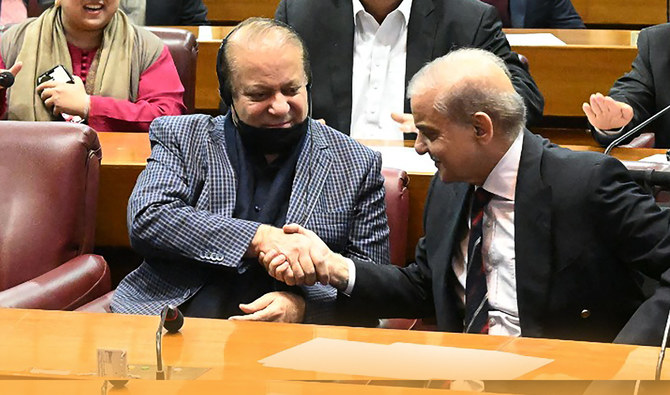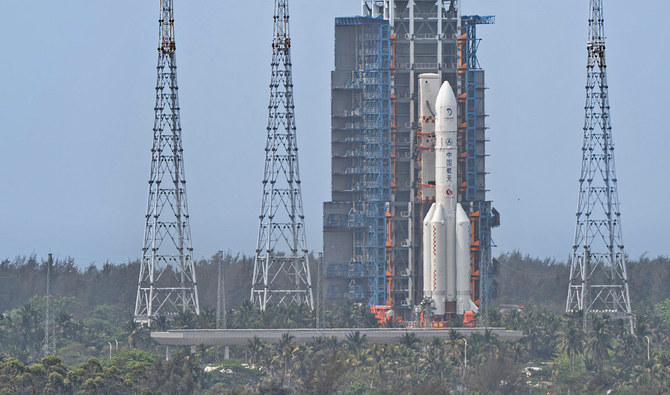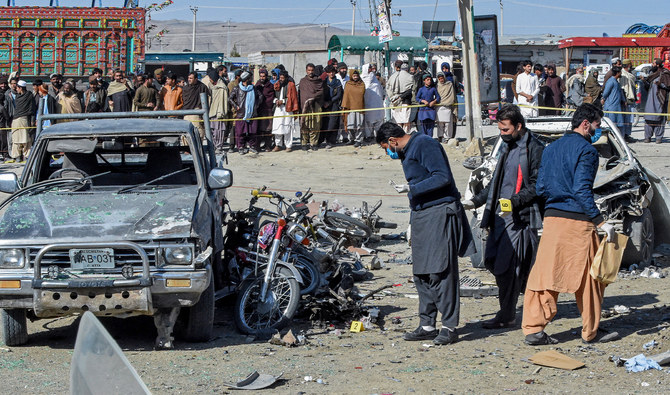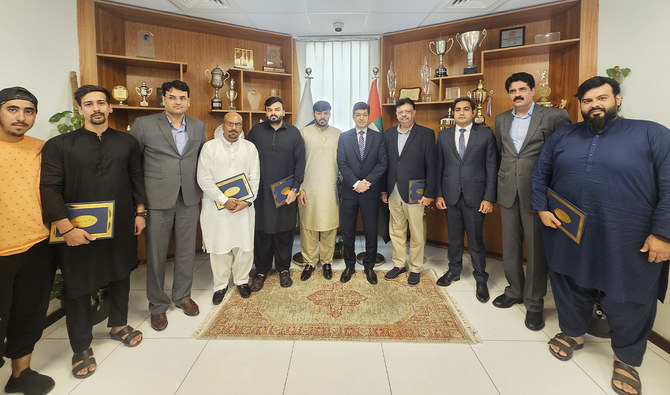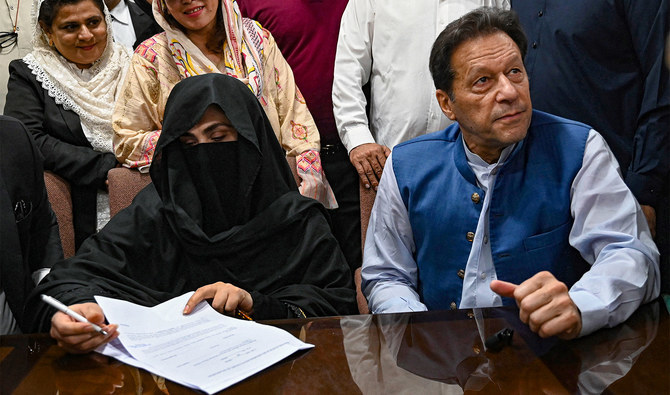ISLAMABAD: Pakistan’s newly elected lower house of parliament on Sunday elected Shehbaz Sharif as prime minister for a second time, putting him back in a role he had stepped down from ahead of general elections on Feb. 8.
Sharif, the candidate for his Pakistan Muslim League-Nawaz (PML-N) and coalition allies, secured a comfortable win over Omar Ayub of the Sunni Ittehad Council (SIC), backed by the Pakistan Tehreek-e-Insaf (PTI) party of jailed former PM Imran Khan.
Elections last month threw up a hung National Assembly and have been followed by weeks of protests by opposition parties over allegations of rigging and vote count fraud.
In his first speech as PM, Sharif, 72, spoke of Pakistan’s burgeoning debt, saying it would be his government’s top priority to resolve the economic woes of the nation of 241 million people.
“The parliament that we are sitting in, even the expenses of its proceedings are being paid through loans … Your salary and the salaries of all these people are being paid through loans,” the new PM said, as PML-N lawmakers cheered and opposition members chanted slogans against the leader of the house.
“We will make Pakistan great and raise our heads high and move forward.”
General visitors were not allowed into the session as speaker canceled the passes to avoid any untoward incident in view of political polarization in the country.
Sharif, the younger brother of former three-time premier Nawaz Sharif, played a key role in keeping together a coalition of disparate parties for 16 months after parliament voted Imran Khan out of office in April 2022, and in securing a last gasp International Monetary Fund (IMF) bailout deal in 2023.
“CHALLENGES”
Independent candidates backed by Khan gained the most seats, 93, after the elections, but the PML-N and the Pakistan Peoples Party (PPP) of the Bhutto dynasty agreed to an alliance to form a coalition government on Feb. 20. No single party won a majority.
The Sunni Ittehad Council backed by Khan alleges that the election was rigged against it and has called for an audit of the polls. Lowering political temperatures will thus be a key challenge for Sharif as Khan maintains mass popular support in Pakistan, and a continued crackdown on his party and his remaining in jail would likely stoke tensions at a time when stability is needed to attract foreign investment to shore up the economy.
Sharif’s main role will also be to maintain ties with the military, which has directly or indirectly dominated Pakistan since independence. Unlike his elder brother, who has had a rocky relationship with the military in all his three terms, the younger Sharif is considered more acceptable and compliant by the generals, most independent analysts say.
For several years, the military has denied it interferes in politics. But it has in the past directly intervened to topple civilian governments three times, and no prime minister has finished a full five-year term since independence in 1947.
Sharif also takes over at a time when the new government will need to take tough decisions to steer the country out of financial crisis, including negotiating a new bailout deal with the IMF. The current IMF program expires this month. A new program will mean committing to steps needed to stay on a narrow path to recovery, but which will limit policy options to provide relief to a deeply frustrated population and cater to industries that are looking for government support to spur growth.
Inflation touched a high of 38 percent with record depreciation of the rupee currency under Sharif’s last government, mainly due to structural reforms necessitated by the IMF program. Pakistan continues to be enmeshed in economic crisis with inflation remaining high, hovering around 30 percent, and economic growth slowing to around 2 percent.
Other big moves by Sharif will include the privatization of loss-making state-owned enterprises such as the flagship carrier Pakistan International Airlines (PIA). The Sharifs have close ties with rulers in Saudi Arabia and Qatar, which could help in securing investments in several projects Pakistan has lately showcased for sale.
Although defense and key foreign policy decisions are largely influenced by the military, Sharif will have to juggle relations with the US and China, both major allies. He is also faced with dealing with fraying ties with three of Pakistan’s four neighbors, India, Iran and Afghanistan.
Pakistan is also facing a troubling rise in militancy, which Sharif’s government will have to immediately tackle.
“There are certainly difficulties but nothing is impossible if there is a will to do,” Sharif said in his maiden speech.
“It is a long journey, thorny journey, full of hurdles but those nations who surmounted these huge obstacles, they became again, one of the most growing nations around the world.”
Speaking on the floor of the house, Ayub described the Feb 8 election as a “selection,” claiming the coalition knew that his party’s mandate was stolen in polls.
“You talk about rule of law, but you never even enforced rule of law,” he said, referring to the prime minister.
He said more than 10,000 PTI workers and supporters were behind bars in the country and called for the release of his party’s leadership, including Khan and his wife Bushra Bibi, saying they were all “political prisoners.”
Political analysts have urged all parliamentary parties, including the PTI-SIC opposition alliance and the government’s coalition partners, to sit together in parliament to devise a strategy to overcome the looming challenges for the good of the people.
“The government should constitute a parliamentary committee to investigate the rigging allegations to the satisfaction of the opposition,” Sohail Warraich, a political analyst and television host, told Arab News.
“Pakistan is faced with multiple challenges, including political and economic instability, therefore the political forces should join their hands to address these crises, instead of quarrelling and hooting in parliament,” he said.
“This is just the start of the new government, so let’s hope for the best.”
“CAN-DO ADMINISTRATOR”
Sharif, born in the eastern city of Lahore, belongs to a wealthy Kashmiri-origin family that was in the steel business. He started his political career as the chief minister of Punjab in 1997 with a signature “can-do” administrative style. Cabinet members and bureaucrats who have worked closely with him call him a workaholic.
As chief minister, the younger Sharif planned and executed a number of ambitious infrastructure mega-projects, including Pakistan’s first modern mass transport system in Lahore.
He was caught up in the national political upheaval when his brother was ousted from the premiership by a military coup in 1999 and he went into exile in Saudi Arabia.
Sharif entered the national political scene again when he became the chief of the PML-N after the elder Sharif was found guilty in 2017 on charges of concealing assets related to the Panama Papers revelations. The Sharifs have been emboriled in multiple corruption cases over the decades, which they say are politically motivated.
Married twice, Shehbaz Sharif has two sons and two daughters from his first marriage. Only one of his sons, Hamza, is in politics and was briefly CM of Punjab in 2023.
With inputs from Reuters



